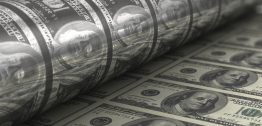The Federal Reserve is preparing to let U.S. interest rates go higher.
Sounds crazy because the underlying conditions resemble those that sparked the Great Recession.
Namely, too much debt. And too much debt doesn’t mix well with rising interest rates.
U.S. households and businesses deleveraged following the financial crisis. But debt levels are lofty again.
In May, U.S. household debt reached a record-high $12.73 trillion. That surpasses its previous record set in 2008.
Meanwhile, government debt continues to grow as well …

And it’s not just the U.S.
In China, debt is having an increasing smaller impact on growth, reports the Financial Times. In 2008, it only took 6.5 million renminbi of new credit to raise nominal GDP by 5 million renminbi. But in 2016, it required 20 million renminbi in new credit to achieve the same economic boost.
China’s public sector still has some wiggle room to absorb the impact of private-sector deleveraging. Outside of China, though, there’s not much wiggle room.
Emerging-market debt makes up 40% of global debt. The cross-border nature of their borrowing means it’s harder for them to manage external pressures on their financial systems.
That in a world where, according to the Bank for International Settlements, non-financial debt in G-20 economies is almost 40 percentage points higher than in 2007.
One economist, Satyajit Das, points out that …
“There are over $3 trillion in stressed loan assets, compared to around $1 trillion of U.S. sub-prime loans which was the catalyst for the 2008/2009 crisis. The World Bank estimates the ratio of non-performing loans (“NPLs”) to total gross loans is comparable the 2009 levels of 4.2% in 2009.”
If it sounds bad, that’s because it is.
But another economist suggests it’s nothing to worry about … yet.
AMP Capital Chief Economist Dr. Shane Oliver argues that lending practices are in much better shape [than in 2008] and that interest rates remain low.
He makes a valid point … unless and until the Federal Reserve unleashes interest rates.
Are lending practices really “in much better shape” than 10 years ago?
One look at China and emerging markets and you might say “no.” But developed markets seem to have fixed their banking systems, right?
But that’s not all. Consider …
A working paper from The Washington Center for Equitable Growth explores the economic impact of credit-supply shocks. The U.S. economic boom and bust from 1982 to 1992 led the center to determine that increased credit boosted aggregate demand in households.
Sound familiar?
Easy money begat the subprime housing debacle that shocked the global financial system. Liquidity dried up. Our central planners replaced that liquidity while they fixed the banking mechanism they claimed was the root of the crisis.
Too bad the root of the crisis was not too little liquidity. It was too much debt. Just as the root of the next crisis will be.
Nevertheless, lawmakers will probably try to deregulate the banking system they just fixed. The U.S. House of Representatives already passed “The Financial CHOICE Act of 2017” that peels back pieces of Dodd-Frank. The Senate has yet to decide on it.
If deregulation happens, the implicit aim will be to increase the supply of credit and boost aggregate demand by U.S. households to incite economic growth.
Can they? Not for long.
U.S. household debt just surpassed record levels. But debt servicing costs are lower than in 2008 and employment is relatively strong.
Maybe this means a new surge in U.S. household credit growth? A last hoorah before this global debt bomb explodes?
As we recently said about the debt situation in Greece:
“You can’t save a nation that’s drowning in debt by throwing more debt at it any more than you could save a drowning man by throwing more water on him.”
Do right,
JR Crooks



Sonny August 19, 2017
The outsiders know what’s happening because we are not a part of the money gravy train agenda. the politicians and Wall St are in bed together and will do what is right for them.
even though it is not correct for Main We can interpret as many times as we want but their forecasts and decisions have been flawed. Main St needs to get their heads out of the sand (mainstream media) and go to their own agenda.
Derek C Howie August 19, 2017
A WORLD INDEX FILE WITH HUAWEI@HOWIE – GUO PING – BILL McDERMOTT – ROBERT KIYOSAKI ONLY THESE CAN MAKE THIS WORLD SEEM RIGHT . LIVE SIMPLY SO THAT OTHERS MAY SIMPLY LIVE Yours In Service D.C.H. out
Jim August 18, 2017
Assuming a person has little / no debt.
How can he earn enough current income to live? Don’t suggest social security will provide more than enough to buy food.
Do you see yield on us treasuries going to seven percent on the ten year???
If so when????
D. A. Grgurich August 18, 2017
Why say that it “sounds crazy” to increase interest rates? Sooner or later the cliff will be reached and the longer past/current policies are being followed, the worse it will be. It does not “sound crazy” at all. It sounds sensible.
Lamont Brantley August 18, 2017
If debit cases were be the problem and
I like to liquidate some of my stocks